FCC Bundle
How Did FCC Rise to Global Prominence?
Founded in Barcelona over a century ago, FCC (Fomento de Construcciones y Contratas, S.A.) boasts a fascinating history of strategic pivots and global expansion. From its humble beginnings as a construction firm in 1900, FCC has evolved into a multinational powerhouse. Discover the key milestones that shaped FCC's journey and its transformation into a leader in public services.
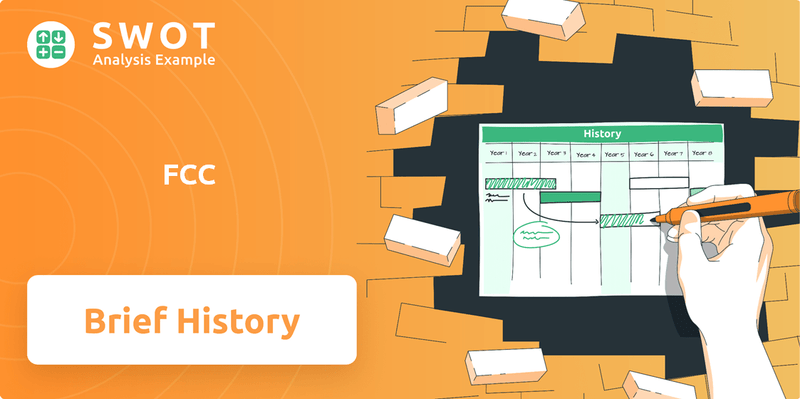
This FCC SWOT Analysis provides a detailed look at the company's current strengths and weaknesses. The company's evolution reflects a continuous adaptation to market needs and a steadfast commitment to sustainability. Understanding the FCC history is crucial for investors and business strategists alike, given its substantial impact on global infrastructure and environmental services.
What is the FCC Founding Story?
The story of the FCC, a significant player in infrastructure and public services, began in Spain over a century ago. The company's origins are deeply rooted in the construction boom of early 20th-century Spain, a period marked by rapid urbanization and the need for advanced infrastructure.
The company's evolution reflects a strategic adaptation to the changing needs of society, transitioning from construction to essential public services. This shift proved crucial for its long-term growth and relevance. The merger of two major entities in 1992 solidified its position as a leader in the industry.
The Growth Strategy of FCC has been shaped by its historical journey, focusing on innovation and sustainable development.
The roots of the FCC, or Fomento de Construcciones y Contratas, S.A., trace back to July 3, 1900, when Fomento de Obras y Construcciones, S.A. (FOCSA) was established in Barcelona, Spain. Initially, the company started with a share capital of 5 million pesetas.
- FOCSA focused on construction projects in Catalonia.
- A key early project was the construction of wharfs at the Port of Barcelona.
- In 1911, FOCSA expanded into public services by securing a contract to manage Barcelona's sewerage network.
- In Madrid, Construcciones y Reparaciones, S.A., later known as Construcciones y Contratas, S.A., was founded by Ernesto Koplowitz.
- The merger of FOCSA and Construcciones y Contratas, S.A., in 1992 created the present-day FCC.
FCC SWOT Analysis
- Complete SWOT Breakdown
- Fully Customizable
- Editable in Excel & Word
- Professional Formatting
- Investor-Ready Format
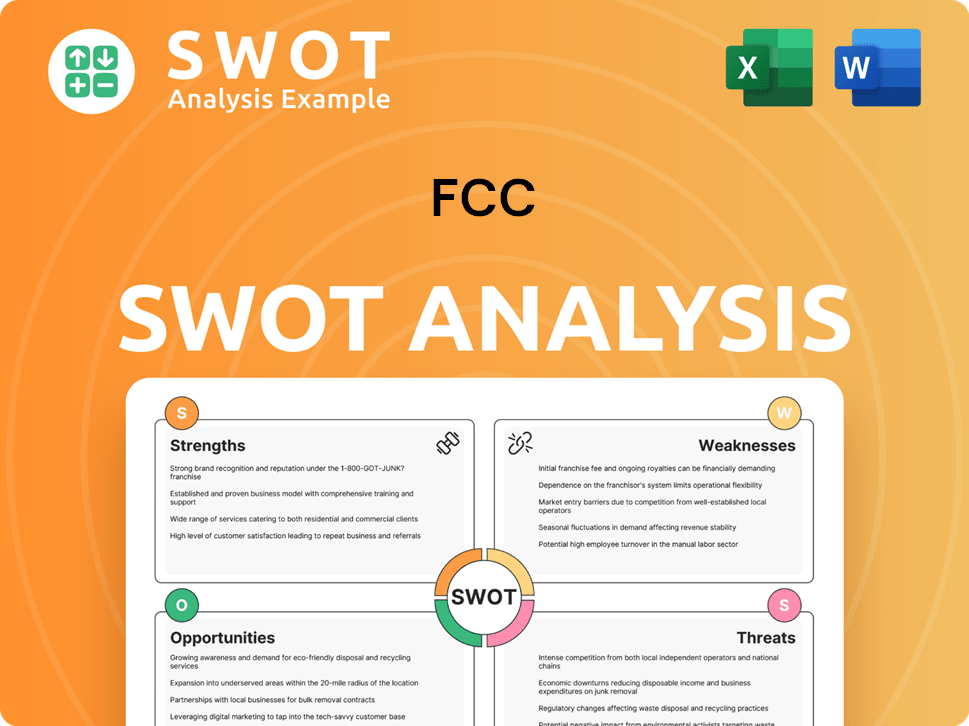
What Drove the Early Growth of FCC?
The early growth and expansion of the company involved significant diversification and strategic moves. Starting with its initial construction focus, the company broadened its operations into public services. This period saw the adoption of innovative technologies and major infrastructure projects that shaped its trajectory. The company's adaptability and strategic vision were key to its early success and expansion.
Following its foundational contract for Barcelona's sewerage system in 1911, the company expanded into public services. In the 1920s, it pioneered asphalt road surfacing in Spain and acquired the first motorized trucks for public services in Barcelona. Cement production was also initiated with Portland Valderrivas starting operations in 1925. This expansion demonstrates the company's early diversification beyond its initial construction focus.
The mid-20th century saw the company involved in major infrastructure projects. These included the construction of the port of Blanes in Girona and the breakwater at the port of Barcelona. Despite collectivization during the Spanish Civil War, commercial operations resumed in January 1939. These projects highlight the company's role in significant infrastructure development during this period.
The 1970s and 1980s marked a period of global expansion, with the company securing construction contracts abroad. The 1992 merger of Fomento de Obras y Construcciones, S.A. (FOCSA) and Construcciones y Contratas, S.A., forming Fomento de Construcciones y Contratas, S.A. (FCC), was a significant milestone, consolidating its position. Also in 1992, the company played a major role in Spain's first high-speed railway between Madrid and Seville, constructing the terminal stations and various track sections.
In recent years, the company has continued its expansion, particularly in its Environment and Water segments. In the first half of 2024, FCC Environment strengthened its presence with acquisitions in the United Kingdom, the United States, and France. In May 2024, FCC Environmental Services acquired Gel Recycling Holdings in Central Florida. The company's construction division also saw significant growth, increasing by 42.6% in the first quarter of 2025, driven by projects like the Scarborough metro extension in Canada, valued at over €1.9 billion. This ongoing expansion and strategic acquisitions highlight the company's adaptive strategies in response to market demands and its commitment to global growth. You can learn more about the company's values by reading about the Mission, Vision & Core Values of FCC.
FCC PESTLE Analysis
- Covers All 6 PESTLE Categories
- No Research Needed – Save Hours of Work
- Built by Experts, Trusted by Consultants
- Instant Download, Ready to Use
- 100% Editable, Fully Customizable
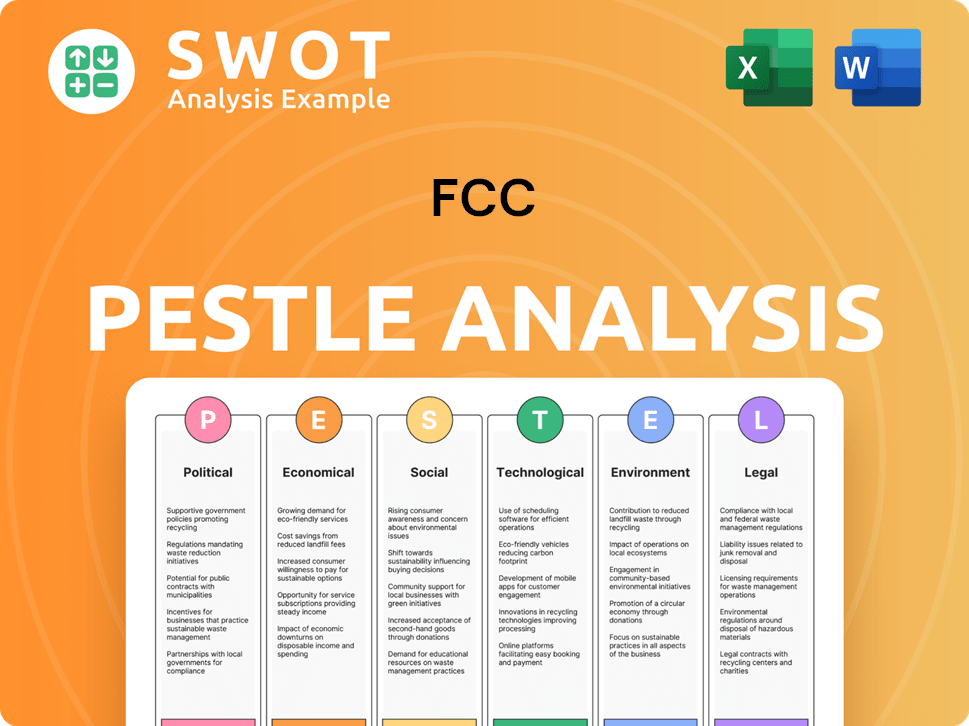
What are the key Milestones in FCC history?
The FCC's history is marked by significant milestones that have shaped its evolution and impact on the telecommunications landscape. From its early days to its modern role, the FCC has navigated numerous challenges and innovations, adapting to technological advancements and evolving societal needs. A deeper understanding of the Marketing Strategy of FCC can further illuminate its trajectory.
| Year | Milestone |
|---|---|
| 1911 | Diversified into public services, including urban sanitation, expanding beyond construction. |
| 1920s | Pioneered the use of asphalt mix road surfacing and acquired the first motorized municipal cleaning vehicles in Spain. |
| 1925 | Expanded into cement production with the opening of the Vicálvaro plant. |
| 1992 | Merged with FOCSA to create the modern FCC Group and was a key player in constructing Spain's first high-speed railway. |
| 1992 | Became the first Spanish construction firm to achieve the AENOR quality certificate. |
| 2024 | FCC Environment CEE Group achieved total sales of €654.4 million, marking an 8% increase from the previous year. |
| 2024 | Partial financial spin-off of Real Estate and Cement businesses under the Inmocemento brand. |
The company has consistently embraced technological advancements, especially in environmental services. This commitment is evident in its early adoption of motorized cleaning vehicles and its later focus on recycling and sustainable solutions.
The early move into public services, such as urban sanitation, demonstrates the company's foresight in expanding its service offerings beyond core construction activities. This diversification allowed the company to tap into new markets and build a more resilient business model.
The company's early adoption of asphalt mix road surfacing in Spain showcased its commitment to innovation in construction techniques. This early adoption of new technologies helped improve infrastructure quality and efficiency.
Acquiring the first motorized municipal cleaning vehicles highlighted the company's focus on operational efficiency and technological advancement. This investment improved the effectiveness of public services.
The merger with FOCSA in 1992 was a strategic move that enhanced the company's capabilities and market reach. This consolidation allowed it to undertake larger and more complex projects.
Being a key player in constructing Spain's first high-speed railway demonstrated its expertise in large-scale infrastructure projects. This participation solidified its reputation as a leading construction firm.
The ongoing innovation in environmental services, particularly in recycling and sustainable solutions, reflects its adaptation to evolving market demands. This focus on sustainability has positioned the company for future growth.
Despite its growth, the company has faced challenges, including market downturns and the need for continuous adaptation. The partial financial spin-off of its Real Estate and Cement businesses in 2024, for example, led to a 43.8% reduction in net profit in the first quarter of 2025.
The company has been subject to the impact of market downturns, which can affect its financial performance and require strategic adjustments. Economic fluctuations can create uncertainty and necessitate flexible business strategies.
The company must continuously adapt to changing market conditions, technological advancements, and regulatory changes. This constant need for adaptation requires strategic foresight and operational flexibility.
The partial financial spin-off of certain business segments, like Real Estate and Cement, can lead to short-term financial impacts. While restructuring can cause temporary reductions in profit, it can also lead to long-term strategic benefits.
Changes in FCC regulations and other industry regulations can create challenges for the company. Navigating these changes requires proactive compliance measures and strategic planning.
The company faces economic and financial pressures, including the need to manage costs, maintain profitability, and secure financing for projects. Effective financial management is crucial for sustained success.
The company operates in a competitive environment and must compete with other firms for contracts and market share. Staying competitive requires continuous improvement and differentiation strategies.
FCC Business Model Canvas
- Complete 9-Block Business Model Canvas
- Effortlessly Communicate Your Business Strategy
- Investor-Ready BMC Format
- 100% Editable and Customizable
- Clear and Structured Layout
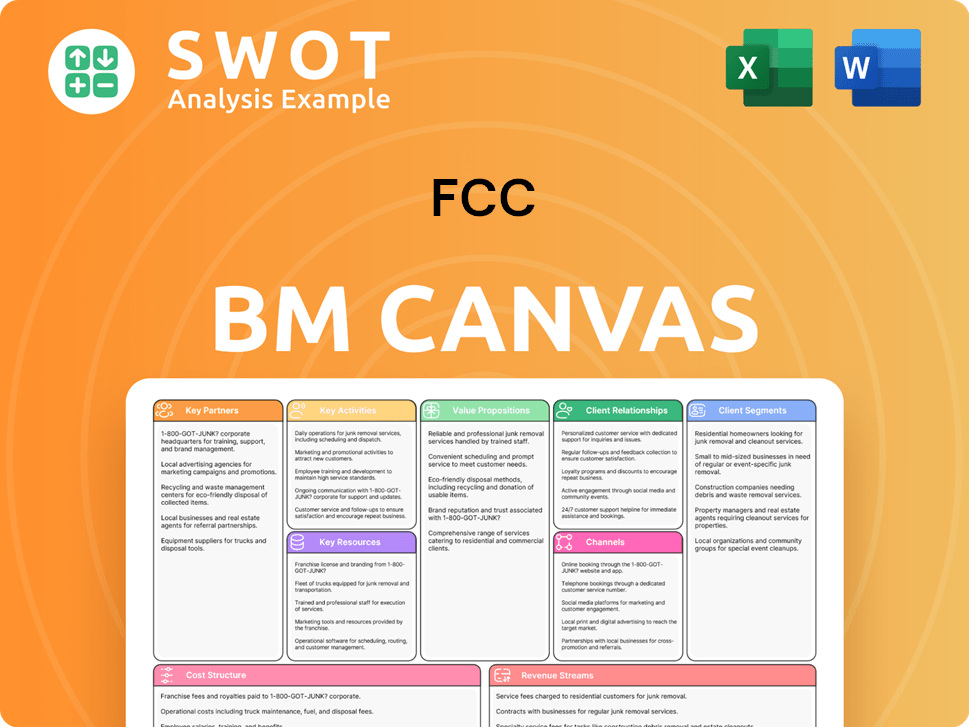
What is the Timeline of Key Events for FCC?
The FCC's history, marked by significant milestones, reflects its evolution and strategic adaptations. From its early days as FOCSA, founded in Barcelona in 1900, the company expanded into public services and cement production. Key moments include the merger with Construcciones y Contratas, S.A. in 1992, forming FCC, and its expansion into environmental services. Recent developments, such as acquisitions in the UK, US, and France, and the partial financial spin-off of its Real Estate and Cement businesses under the Inmocemento brand in November 2024, highlight its growth. In the first quarter of 2025, the company showed strong revenue growth.
| Year | Key Event |
|---|---|
| 1900 | Fomento de Obras y Construcciones, S.A. (FOCSA) is founded in Barcelona. |
| 1911 | FOCSA diversifies into public services with a contract for Barcelona's sewerage network. |
| 1925 | Portland Valderrivas, a cement production entity, begins operations. |
| 1939 | The company resumes commercial operations after the Spanish Civil War. |
| 1984 | F.C.C. Co., Ltd. (formerly Fuji Chemical Co., Ltd.) changes its name. |
| 1992 | FOCSA merges with Construcciones y Contratas, S.A., forming Fomento de Construcciones y Contratas, S.A. (FCC). |
| 1995 | FCC receives its first ISO 9001 certification. |
| 2005 | FCC becomes the majority owner of FCC Environment CEE. |
| 2012 | Focsa Services and Waste Recycling Group merge and rebrand as FCC Environment (UK) Limited. |
| 2024 (First Half) | FCC Environment strengthens its presence with acquisitions in the United Kingdom, the United States, and France. |
| 2024 (November) | FCC completes the partial financial spin-off of its Real Estate and Cement businesses under the Inmocemento brand. |
| 2024 (Year-End) | FCC Group reports revenues of €9,071.4 million, up 10.4% from 2023, and EBITDA of €1,435.3 million, up 11.7%. |
| 2025 (First Quarter) | FCC Group revenue increases by 8.9% to €2,181.7 million. |
FCC is focused on continued growth in environmental services, water management, and infrastructure. Strategic initiatives include international expansion and leveraging technology. With a revenue backlog of €45,757.6 million as of March 31, 2025, the company is poised for future projects.
The company is investing in key markets and focusing on environmental stewardship. The construction division's portfolio grew by 30% in the first quarter of 2025, driven by international projects. FCC Environmental Services secured a new seven-year contract in Florida, starting January 1, 2026.
FCC Group's revenue for 2024 reached €9,071.4 million, with EBITDA at €1,435.3 million. In the first quarter of 2025, revenue increased by 8.9% to €2,181.7 million. These figures reflect the company's strong financial health and growth trajectory.
Analyst predictions and leadership statements emphasize FCC's commitment to urban development and infrastructure projects. The company's focus aligns with its founding vision of contributing to public well-being through essential services, positioning it for sustained success.
FCC Porter's Five Forces Analysis
- Covers All 5 Competitive Forces in Detail
- Structured for Consultants, Students, and Founders
- 100% Editable in Microsoft Word & Excel
- Instant Digital Download – Use Immediately
- Compatible with Mac & PC – Fully Unlocked
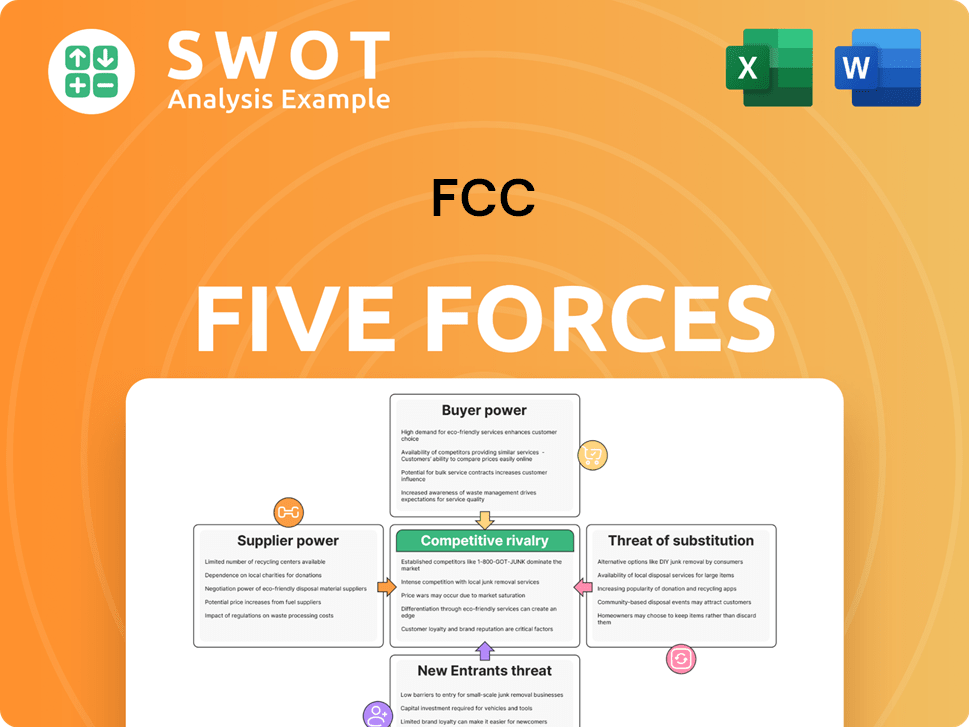
Related Blogs
- What is Competitive Landscape of FCC Company?
- What is Growth Strategy and Future Prospects of FCC Company?
- How Does FCC Company Work?
- What is Sales and Marketing Strategy of FCC Company?
- What is Brief History of FCC Company?
- Who Owns FCC Company?
- What is Customer Demographics and Target Market of FCC Company?
Disclaimer
All information, articles, and product details provided on this website are for general informational and educational purposes only. We do not claim any ownership over, nor do we intend to infringe upon, any trademarks, copyrights, logos, brand names, or other intellectual property mentioned or depicted on this site. Such intellectual property remains the property of its respective owners, and any references here are made solely for identification or informational purposes, without implying any affiliation, endorsement, or partnership.
We make no representations or warranties, express or implied, regarding the accuracy, completeness, or suitability of any content or products presented. Nothing on this website should be construed as legal, tax, investment, financial, medical, or other professional advice. In addition, no part of this site—including articles or product references—constitutes a solicitation, recommendation, endorsement, advertisement, or offer to buy or sell any securities, franchises, or other financial instruments, particularly in jurisdictions where such activity would be unlawful.
All content is of a general nature and may not address the specific circumstances of any individual or entity. It is not a substitute for professional advice or services. Any actions you take based on the information provided here are strictly at your own risk. You accept full responsibility for any decisions or outcomes arising from your use of this website and agree to release us from any liability in connection with your use of, or reliance upon, the content or products found herein.